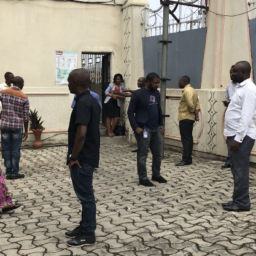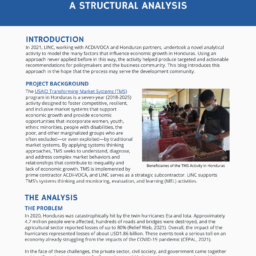This is the fourth and last blog LINC is publishing to celebrate its 10th anniversary.
Welcome to the fourth and final entry of LINC’s 10th-anniversary blog series!
In our first entry, “Getting to Know LINC”, we introduced you to LINC’s history, its people, and its mission: “working alongside local actors to create sustained change”. In the second and third entries, “A decade Supporting Locally Led Development” and “A Decade of MERL Innovation”, respectively, we shared stories that illustrate LINC’s focus on and commitment to locally led development and our innovative Monitoring, Evaluation, Research, and Learning (MERL) practices.
In this, our final entry, we share our experience applying systems thinking in international development, one of the pillars of our work and an area in which LINC has done pioneering work.
We often hear international development practitioners say that our goal should be to “work ourselves out of a job”, meaning that sustained development should be achieved to a level where development interventions are no longer needed. At LINC, we agree that the best way to accomplish that is to help local actors own their own development (or what we now understand as “localization”), and we believe that addressing development efforts with a systems thinking lens is the best way to achieve that.
This is why at LINC, we conduct our work with a “local systems approach”. One where the actors, relationships, dynamics, and context associated with the local system that holds the problem in place, are considered as part of the solution; one that recognizes the weaknesses of the system, but that also finds capabilities that should be strengthened and leverages opportunities where our intervention as development partners, would contribute to achieving systemic change.
LINC at the Forefront
LINC’s industry-leadership in applying systems thinking tools in the international development context began when it conducted an Organizational Network Analysis in Nicaragua under the USAID-sponsored “Workforce Connections” Community of Practice.
When LINC became involved, “65 percent of the unemployed population in Nicaragua was under 30 years of age. Services provided by training institutions, employment agencies, and other workforce development actors were weakly aligned with the demands of employers, and there was little apparent collaboration among them” (LINC, Nicaragua Workforce Development).
These complex conditions provided the scope for LINC to conduct an Organizational Network Analysis (ONA), in which the ecosystem of relevant organizations and the nature of their interconnectedness is explicitly mapped, to identify opportunities for strengthening the youth workforce development network.
Based on the important insights and opportunities that resulted from the ONA, LINC developed an interactive network map to demonstrate how network analysis can be used to address challenges in international development program design. LINC presented the map and accompanying tutorial at USAID’s Local Systems Community and Innovation Fair in 2017.
Systems Thinking in USAID Programming
In 2016, LINC joined the John Hopkins University-led consortium implementing the Strategic Program for Analyzing Complexity and Evaluating Systems (SPACES MERL). SPACES’ main objective is to bring a variety of tools and methodologies that decision-makers can use (alone or in combination) to understand systemic constraints, opportunities, and potential unintended consequences of development interventions.
Under SPACES, LINC co-authored the “Systems and Complexity White Paper“ through which USAID formally introduced and encouraged systems thinking in USAID programming.
Through SPACES, LINC has also supported different USAID Missions and Bureaus in applying systems thinking tools like Social Network Analysis, Causal Loop Diagrams, Participatory Systems Mapping, and Outcome Harvesting, to design, implement, and assess activities around the world and in a range of technical sectors.
For instance, LINC supported USAID and the UK’s Department of International Development (DFID) in their efforts to improve education in Rwanda, by developing and facilitating participatory systems mapping workshops to produce a better understanding of factors that influence early grade learning outcomes.
Development Practitioners Welcome Systems Thinking
In the last decade, the international development community has embraced and further adapted the use of systems thinking tools in practice. At present, most practitioners agree that development work is conducted in complex environments and that a linear, programmatic approach is not the best path to address the complex problems that we are trying to tackle.
In 2019, LINC and its partners on the LINC-led “Local Systems Practice (LSP)” Activity (2017-2020) developed and launched a set of systems thinking courses. The objective of this activity was to make systems thinking more accessible to development practitioners and local actors. The curriculum was focused on tools like Social Network Analysis and Causal Loop Diagrams and was targeted to development stakeholders from host countries. The trainings took place in Mexico City, Mexico, and Bangkok, Thailand, and attendees included close to 100 participants from 25 organizations from Latin America and Asia. See: LSP User’s Guide.
Surveys conducted after the trainings revealed that 100 percent of participants felt “more able to design and implement solutions to local development challenges” and 95 percent “used one or more of the systems thinking methods in their organizations or projects.”
Impressions from these surveys became tangible when, in 2020, organizations that had attended the trainings came together and formed the “Community of Practice for Effective Partnership (COPE)” and invited LINC to serve as a core resource partner providing training, technical assistance, and capacity-strengthening on systems thinking, collective action, communities of practice, and monitoring and evaluation.
COPE was recently awarded $2 million by USAID’s Local, Faith, and Transformative Partnerships (LFT) Hub to foster South-South collaboration and promote the use of systems thinking to overcome development challenges.
Systems thinking has been an important part of LINC’s work since the beginning, and its teams continue to apply, adapt, and innovate systems thinking approaches and tools in their work. Systems thinking has allowed us to support the capacity strengthening of local actors and systems, enabling host-country communities to play a more prominent role in their development.
Adopting a local systems approach has made us facilitators of change, putting host actors back in the lead. Implementing development projects with a local systems approach promotes changes that are lasting and enduring, because they are made from within the system that knows the conditions that first created the problem and understand what it would take to solve it.
Authored by Stephanie Lacouture, Caroline Njihia, Matt Klick, Patrick Lohmeyer, and Rich Fromer.





